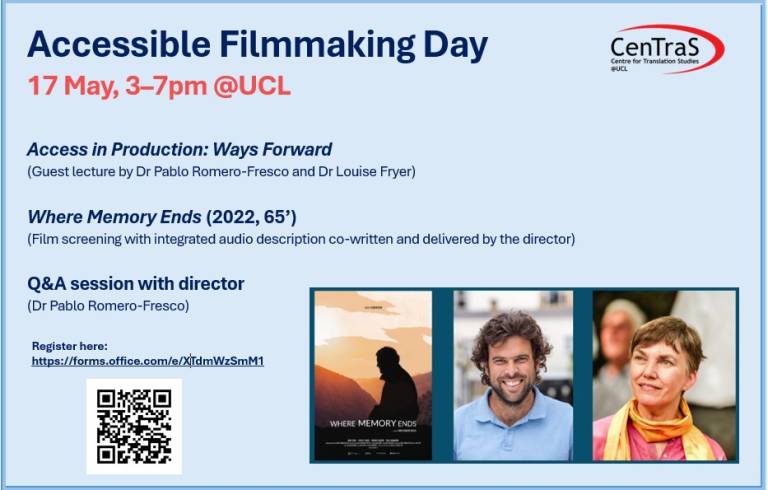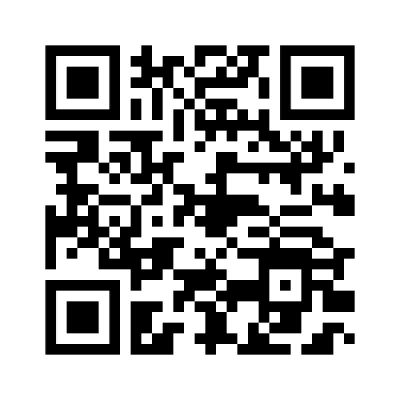Accessible Filmmaking Day
17 May 2024, 3:00 pm–7:00 pm

The UCL Centre for Translation Studies' is offering two free events as part of the Accessible Filmmaking Day.
This event is free.
Event Information
Open to
- All
Availability
- Yes
Cost
- Free
Organiser
-
Alejandro Bolanos-Garcia-Escribano
Location
-
University College London (UCL)225, Central House & Gustav Tuck LT. Centre for Translation Studies (CenTraS)Bloomsbury Campus Gower StLondonWC1E 6BT
The Filmmaking Day will consist of a talk entitled Access in Production: Ways Forward, by Dr Pablo Romero-Fresco and Dr Louise Fryer. As well as an accessible screening of Pablo Romero-Fresco’s film 'Where Memory Ends'.
Programme and venue information:
3 to 4.30 pm: Talk entitled Access in Production: Ways Forward (guest lecture)
(Dr Pablo Romero-Fresco and Dr Louise Fryer)
Location: 225, Central House (14 Upper Woburn Place, WC1H 0NN)
4.30 to 5 pm: Break (Please note, there is a 10-minute walk between both venues.)
5 to 7 pm: Accessible film screening of Where Memory Ends followed by a Q & A session with the director Dr Pablo Romero-Fresco (version with integrated audio description delivered by the director).
Location: Gustav Tuck Lecture Theatre (North and South Junction, Third Floor, Gower St, WC1E 6BT)
7 pm: Reception at South Cloisters (Wilkins Building)
Location and full access information:
Please use the links to our video guides for further information on accessibility:
Video Guide 1: UCL’s Gower St entrance to Gustave Tuck LT
© Xinyue Shang
Video Guide 2: Central House to Gustav Tuck LT
© Xinyue Shang
If you require any further access information please contact the organiser (Alejandro Bolanos-Garcia-Escribano) to receive access instructions. Otherwise, you will also be contacted when you fill in the registration form.
To book a place, please complete the registration form by clicking the 'Book Now' link or you can access the form via this QR code:

Access in Production: Ways Forward
(talk by Dr Pablo Romero-Fresco and Dr Louise Fryer)
Media accessibility is changing rapidly. Although it has always been a highly technologized area, the widespread use of AI has made automation a reality, which is having a significant impact on some areas of the industry. As workflows are adapted and reconsidered, so is the general approach to access adopted by broadcasters, streaming services and production companies. In the consultation initiated in September 2023 to update its official guidelines, Ofcom argues that a requirement-heavy, one-size-fits-all approach is no longer viable and that in order to be future-proof and have an actual impact on society, guidelines must be flexible and account for different types of users and alternative approaches beyond traditional access practices. The new proposed guidelines state that access is “not only about the provision of information, but about ensuring audiences’ enjoyment of the programme” (ibid: 45). For Ofcom, one of the keys to ensuring this forward-looking approach is to consider accessibility issues early in the content production process, which may be done by including content accessibility experts in productions. This panel will look at the different ways in which access is being considered at the production stage across cultures and audiovisual genres.
Pablo Romero-Fresco will present the new media access spectrum, ranging from standard, guideline-based access to alternative practices that are usually built in at the beginning of the production and that are often led by disabled artists or access experts. The focus will be placed here on the access coordinator, a new professional figure that works as a link between creators and access experts. Louise Fryer will talk about lessons learnt from access in live performance where discussions about access start at the project design stage with access built into the scripting, costume and sound design, and involve access consultants working with the creative team rather than working alone as “access saviours” after the project has been realised.
Where Memory Ends (2022), 65’
(version with integrated audio description co-written and delivered by the director, Pablo Romero-Fresco, who will participate in a Q&A session after the screening)
In 1933, Luis Buñuel travelled to Las Hurdes, an isolated and desperately impoverished region in Central Spain, to make the landmark documentary Land Without Bread. 85 years later, the Hispanist and biographer Ian Gibson made the same journey to complete the work of a lifetime.
Where Memory Ends travels through Las Hurdes and the Residencia de Estudiantes with the collaboration of Mike Dibb, Carlos Saura and Román Gubern to build the portrait of Ian Gibson –a literary detective who has devoted his life to recover the recent memory of Spain through the biographies of three of its most recognised geniuses: Buñuel, Dalí and Lorca. The journey ends in Granada, where, after a 50-year-long search, Gibson is closer than ever to finding Lorca’s remains in an attempt to bring reconciliation for a country that refuses to make peace with its past.
Full Programme details:
Guest speakers:
Dr Pablo Romero-Fresco (Senior Lecturer and Film Director)
Dr Louise Fryer (Professional Audio Describer)

Sponsors:
Centre for Translation Studies
Instituto Cervantes (London)
Galician Observatory for Media Accessibility

 Close
Close

